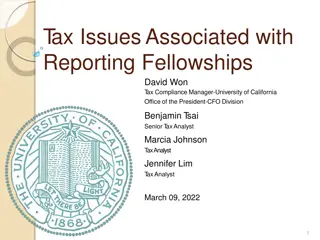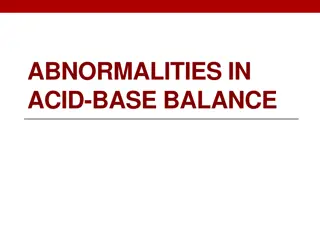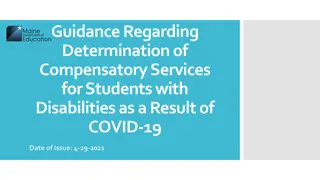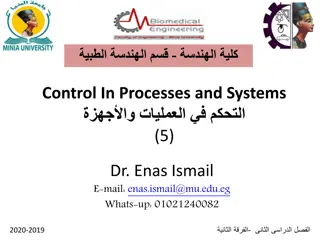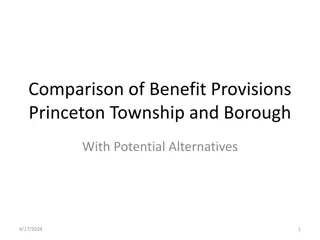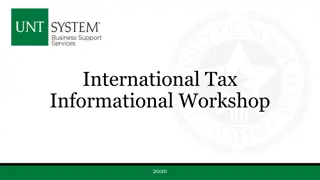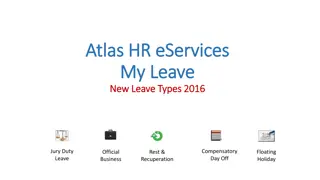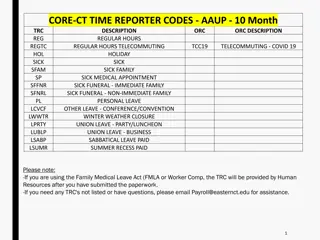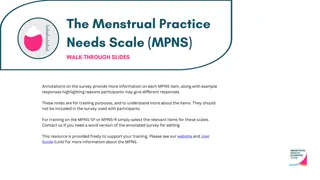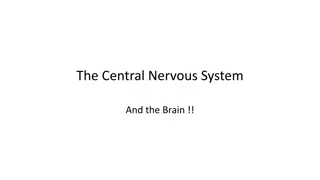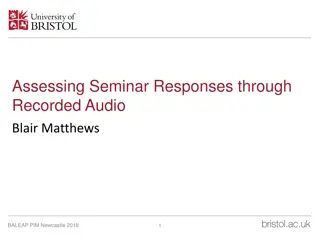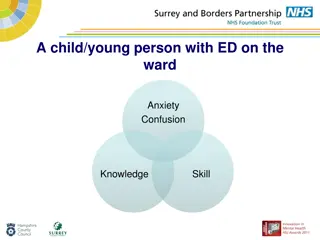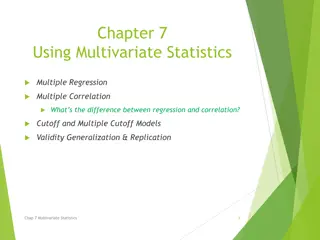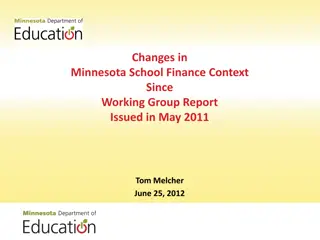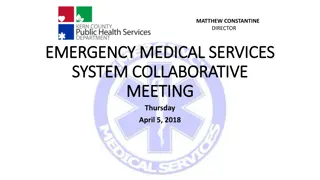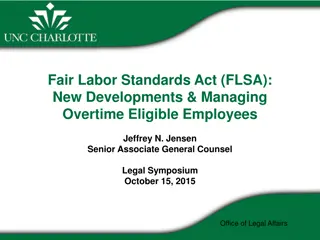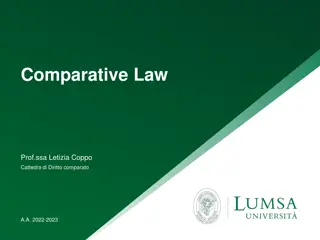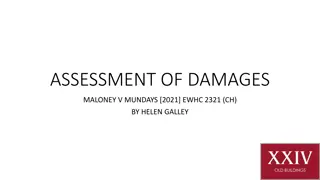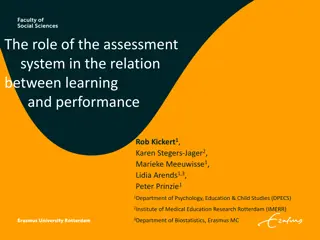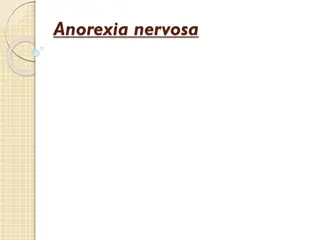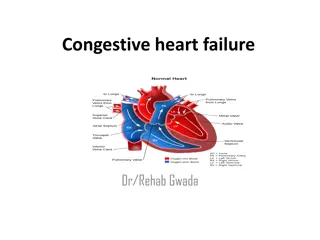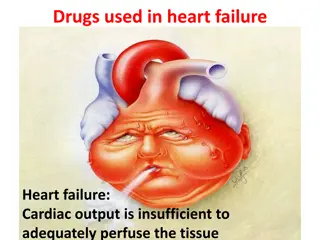Understanding Shock: Causes, Symptoms, and Stages
Shock is a critical condition caused by an imbalance between cellular oxygen supply and demand, leading to organ dysfunction. Compensatory responses include increased heart rate, vasoconstriction, and hormonal adjustments. Recognizable features of shock include tachycardia, hypotension, cool clammy
3 views • 27 slides
Breathe 1-Month Survey 2021-2023 Head Start Responses Analysis
This report analyzes responses from the Breathe 1-Month Survey 2021-2023 in the Head Start program. It covers the roles of participants, frequency of material usage, usefulness of materials in tobacco education, and future likelihood of material use. Insights into the engagement and perceptions of t
0 views • 5 slides
Thematic Working Group for Libya Flood Responses - Updates and Coordination Efforts
Thematic Working Group for Libya Flood Responses held a meeting on 17 October 2023 to discuss coordinated responses, targeting needs and damage assessments. Updates and documents published by partners after 10 October 2023 were shared, including reports from SRSG Abdoulaye Bathily and various agenci
0 views • 10 slides
Understanding Tax Reporting for Fellowship Grants at UC
This presentation addresses tax reporting issues associated with fellowship grants for UC graduate students. It explains the treatment of fellowship grants for income tax purposes, distinguishing between compensatory and non-compensatory grants. It also clarifies the taxable and nontaxable aspects o
0 views • 43 slides
Understanding Acid-Base Balance in Health and Disease
Many critical illnesses can disrupt acid-base balance, indicating underlying diseases or organ damage. Interpretation of disturbances requires analyzing arterial blood gases, plasma electrolytes, and compensatory mechanisms. Acid-base disorders are classified into respiratory acidosis, respiratory a
3 views • 26 slides
Ensuring Compensatory Services for Students with Disabilities Post-COVID-19
Educational guidance emphasizes providing compensatory services for missed specially designed instruction and related services due to the pandemic, ensuring the fulfillment of a Free Appropriate Public Education (FAPE) for students with disabilities. The individualized determination of compensatory
0 views • 16 slides
Understanding Profit: The Entrepreneur's Reward
Profit is the reward for entrepreneurial functions and differs from returns on other factors due to its uncertain and residual nature. Various theories such as Frictional, Monopoly, Compensatory, and Innovation shed light on the complexities of profit generation in business.
0 views • 15 slides
Discovery Motions in Civil Pretrial Practice
In civil pretrial practice, discovery motions play a crucial role when the opposing party fails to respond adequately to formal discovery requests. These motions include Motion to Compel, Motion to Compel Further, and Motion to Deem Facts Admitted. By filing these motions, parties can seek court ord
0 views • 17 slides
Understanding Responses to Social Influence in Psychological Context
Social influence plays a significant role in shaping human behavior, with responses such as acquiescence, internalization, and identification affecting individual conformity to group norms. Conformity reflects matching attitudes, beliefs, and behaviors to group standards, which may lead to groupthin
0 views • 16 slides
Understanding Time Domain Dynamic Responses in Control Systems
In the field of control systems, analyzing time domain dynamic responses is essential for evaluating system performance. This involves studying transient and steady-state responses, as well as characteristics such as steady-state error. By examining these responses to standard input signals, insight
4 views • 30 slides
Benefit Provisions Comparison: Princeton Township vs. Borough & Alternatives
This document compares the benefit provisions related to overtime, compensatory time, and longevity between Princeton Township and Borough, along with potential alternatives for each category. Variations in overtime pay, compensatory time policies, and longevity bonuses are discussed, highlighting d
0 views • 29 slides
Understanding Chemistry through Open-Ended Questions
The content provides a detailed assessment of student responses to open-ended chemistry questions related to hydrogen peroxide and its applications in teeth whitening gels. Various student answers are analyzed based on their understanding of the chemistry concepts involved, with explanations given f
1 views • 18 slides
Transboundary Environmental Impact Assessment for Greenstar Development
The Transboundary Environmental Impact Assessment (EIA) conducted for the Greenstar Development project involving EU Member States A and B reveals potential environmental impacts like soil and waste deposition, polluted dredging material transfer, and altered currents affecting wetlands and flooding
0 views • 7 slides
Understanding Taxable Scholarships at International Tax Informational Workshop
Explore the essentials of taxable scholarships at an informational workshop for international students and employees. Learn about compensatory payments, Forms W-2 and 1042-S, and how to differentiate between qualified and non-qualified education expenses to manage tax liabilities effectively.
0 views • 22 slides
Atlas HR eServices - Leave Types and Application Procedures
This content provides detailed information on various leave types and application procedures within the Atlas HR eServices platform. It covers topics such as Jury Duty Leave, Compensatory Day Off, Floating Holiday (NY), Official Business, Rest & Recuperation, along with guidelines on how to apply fo
0 views • 12 slides
Core-CT Time Reporter Codes and Descriptions for AAUP Employees
This document provides detailed time reporter codes and descriptions for AAUP employees working on a 10-month or 12-month schedule. It includes information on regular hours, telecommuting, holidays, sick leave, family medical leave, personal leave, vacation, union leave, sabbatical leave, and more.
0 views • 7 slides
Organisms' Responses to Environmental Changes
Organisms demonstrate responses to changes in their environment through stimuli and reactions. These responses can be internal or external, leading to behaviors such as seeking food, avoiding danger, or adjusting growth patterns. Examples include animals seeking food when hungry or plants growing to
3 views • 15 slides
Enhancing Understanding of MPNS Items Through Annotations and Example Responses
Gain deeper insights into each MPNS item through detailed annotations and example responses, shedding light on potential reasons for varied participant responses. These resources are ideal for training purposes to improve comprehension of the MPNS-SF and MPNS-R scales. Contact us for editable versio
0 views • 37 slides
Understanding Nicotine Reduction Strategies for Tobacco Regulation
This information discusses the importance of reducing nicotine content in tobacco products to lower addiction levels and overall harm. It emphasizes the FDA's comprehensive plan for tobacco and nicotine regulation, aiming to shift users to less harmful alternatives. Immediate reduction in nicotine h
0 views • 19 slides
Understanding the Central Nervous System and Brain
The central nervous system plays a crucial role in enabling organisms to respond to stimuli and adapt to changes in the environment. Comprising receptors, neurones, and effectors, this system facilitates the detection of stimuli, transmission of messages, and appropriate responses. Neurones, includi
0 views • 18 slides
Seminar Responses Assessment Method Using Recorded Audio
Seminar responses are challenging to assess due to group dynamics. A novel approach involves students watching seminar excerpts and recording responses as if present. The method is practical and aids in assessing language skills effectively. This study delves into the practicability and language ass
0 views • 17 slides
Comprehensive Management Guidelines for Pediatric Eating Disorders
This comprehensive guide covers the management of children and young persons with eating disorders, focusing on anxiety, confusion, knowledge, and skill development. It emphasizes the partnership between pediatricians and psychiatrists, specific medical and nutritional aspects, adequate support, and
0 views • 29 slides
University of California PPSM-30: Student Life & Leadership Compensation Guidelines
University of California PPSM-30 outlines guidelines regarding meal periods, rest breaks, overtime approval, and compensation for non-exempt employees. It specifies the meal period duration, rest break allocation for full-time and part-time employees, and the process for seeking advance approval for
0 views • 9 slides
Understanding Multivariate Statistics: Regression, Correlation, and Prediction Models
Explore the differences between regression and correlation, learn about compensatory prediction models, understand the role of suppressor and moderator variables, and delve into non-compensatory models based on cutoffs in multivariate statistics.
0 views • 9 slides
Changes in Minnesota School Finance Context Since 2011 Report
Explore the changes in Minnesota's school finance context post the 2011 Working Group Report by Tom Melcher. Topics include funding adjustments, basic formula increases, literacy aid introduction, small schools aid implementation, and one-time compensatory aid for FY 2013.
0 views • 24 slides
Understanding Dementia and Speech Therapy by Vincent Delgiudice
Dementia impacts speech, swallowing abilities, and quality of life. Vincent Delgiudice, a certified SLP, offers therapy to enhance memory, communication, and safe swallowing strategies. Dysphagia in dementia needs evaluation for proper treatment. Learn about types of dementia symptoms and different
0 views • 19 slides
European Social Policies and EU Limits: A Comprehensive Overview
EU social policies are guided by the principle of subsidiarity, ensuring decisions are made close to the citizens. The EU's role is to set framework conditions and compensatory programs, while social policy largely remains the responsibility of individual member states. The Union can act in a policy
0 views • 16 slides
Effect of Efgartigimod on Humoral Vaccine Responses in Patients with Autoimmune Diseases
The study explores the impact of Efgartigimod, a Neonatal Fc Receptor blocker, on humoral vaccine responses in patients with autoimmune diseases. It discusses how immunosuppressive therapies used in autoimmune disorders may affect susceptibility to infections and impair vaccine immunogenicity, highl
0 views • 18 slides
Emergency Medical Services System Collaborative Meeting Highlights
Highlights from the Emergency Medical Services System Collaborative Meeting on April 5, 2018, including introductions, ReddiNet bed availability for MCI response, monthly notices and responses, year-to-date alerts and responses, patient distribution, bed availability reporting for February and March
0 views • 66 slides
Overview of Fair Labor Standards Act (FLSA) and Overtime Management
Explore the Fair Labor Standards Act (FLSA) history, current regulations, minimum wage requirements, and compensation options for overtime-eligible employees. Learn about the basic tenets of wage and hour laws, including minimum wage and overtime pay rules. Delve into the concept of compensatory tim
0 views • 36 slides
Understanding Comparative Property Law in the Contemporary Legal Landscape
Comparative Property Law explores the common challenges and fundamental questions of contemporary tort law, covering topics such as tort liability, legal positions protected by tort law, criteria for attributing liability, compensatory, deterrence, and punitive functions of tort law, and more. The i
0 views • 37 slides
Legal Options for Client in Torts Case
This content covers essential topics related to tort law, such as letters of advice outlining out-of-court settlement vs. lawsuit options, vocabulary use, a compulsory assignment, and the concept of frivolous lawsuits. It also explains punitive vs. compensatory damages through real-life examples inv
0 views • 26 slides
Legal Principles for Assessment of Damages in Contract and Tort Cases
In the assessment of damages in legal cases involving breaches of contract or tortious acts, various principles come into play. These include the normal rule of compensation, the diminution in value rule, and different approaches to determine the extent of compensation based on factors such as prope
0 views • 14 slides
Understanding Constructed Response Items in Education
Exploring the concept of constructed response items in education, this content delves into the complexities of student responses, assessment for learning, rubric development, and differentiation strategies. Richard Woods, Georgia's School Superintendent, provides insights on how to navigate through
0 views • 31 slides
The Role of Assessment Systems in Learning and Performance
The study explores the impact of assessment systems on academic progress and performance in a medical school setting. It compares the outcomes of students under old conjunctive assessment systems to those under new compensatory systems, analyzing differences in self-regulated learning, participation
0 views • 15 slides
Understanding Shock: Types, Classification, and Clinical Course
Shock is a critical state where the circulatory system fails to adequately perfuse cells, leading to oxygen and nutrient delivery reduction. It can be classified into hypovolemic, cardiogenic, and distributive types, with septic shock caused by microbial infections. Shock progresses through stages f
0 views • 8 slides
Understanding Anorexia Nervosa, Bulimia Nervosa, and Post-Partum Psychiatric Disorders
Anorexia nervosa is characterized by significant weight loss, fear of gaining weight, and disturbed body image. It predominantly affects women in adolescence, often associated with dieting and harmful behaviors. Diagnosis involves criteria such as weight loss and amenorrhea. Complications include em
0 views • 14 slides
Understanding Congestive Heart Failure: Causes, Pathophysiology, and Management
Congestive heart failure (CHF) is a condition where the heart cannot pump enough blood to meet the body's needs, often caused by conditions like hypertension and coronary artery disease. Factors affecting cardiac output include preload, heart rate, stroke volume, afterload, and contractility. The pa
0 views • 23 slides
Therapeutic Strategies in Heart Failure Management
Heart failure is a serious condition characterized by inadequate cardiac output. Compensatory responses include sympathetic nervous system activation, renin-angiotensin-aldosterone system stimulation, and natriuretic peptide release. Pharmacologic therapies target salt and water retention, afterload
0 views • 25 slides
Intersectional STEM Network Formation for Underrepresented Students
Addressing the underrepresentation of women and people of color in STEM, this study explores the impact of peer networks on the persistence of underrepresented high school students of color in STEM at the postsecondary level. It delves into how race and gender intersect to influence the creation and
0 views • 16 slides



